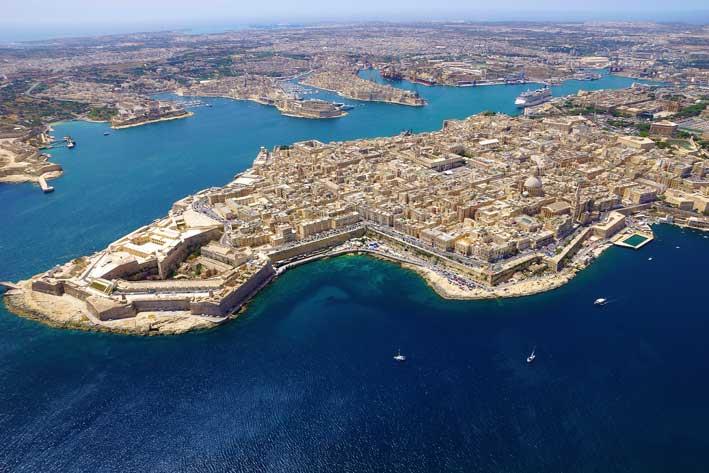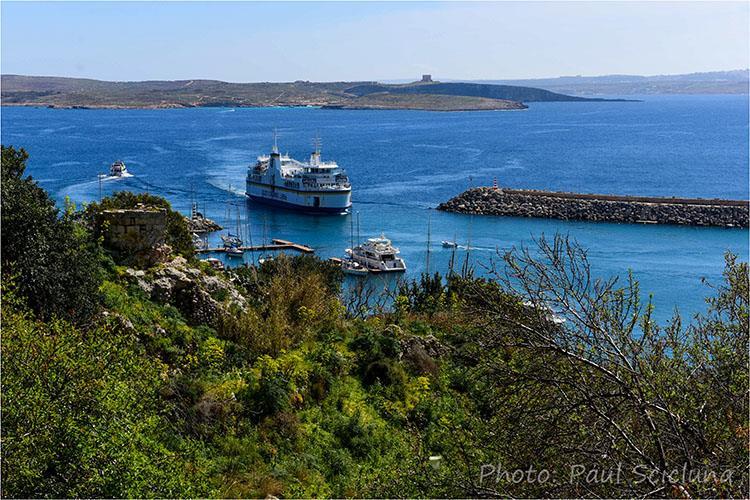The roles of the Environment and Resources Authority, local councils as well as NGOs should be ingrained in the planning process, PN spokesperson for Planning, Stanley Zammit said.
In an interview with The Malta Independent on Sunday, Zammit agreed that parts of Malta have become quite ugly and that intense development is having an impact on the country's urban environment.
This is one of the reasons why 60% of youths in a recent survey said they want to leave the country, he said.
“What happened is that the government separated the environment from planning and created two tribes. Many of us new MPs were elected on the call for a new style of politics, one that is not tribal, one without polarisation. In planning, this separation was created and we created two enemies. The environment and aesthetics ended up being the by-product of planning – meaning first we plan, issue permits and the environment is what then remains. That is what happened as planning was not tackled holistically – we forgot about aesthetics, infrastructure, traffic management, clean air, distances, we reduced the heights between floors to make room for more people. Density increased and quality of life decreased.”
He was asked about past ideas, such as giving the ERA a veto in planning applications.
“We believe that the roles of the ERA, of NGOs and of local councils should be ingrained in the planning process," he said.

The PN MP said that there are applications where even case officers' reports are being ignored, using this as an example to highlight the level of consultation, or lack of, the aforementioned entities are afforded.
Zammit believes that this should be ingrained in the planning process “but not in the form of red tape as is happening with the Building and Construction Authority (BCA). A few years ago we witnessed a number of tragedies, where some buildings collapsed. Government panicked, had no plan and created another entity."
The PN MP highlighted an issue with the way it was set up. First one would need to go through the PA permit process, but after would also need to go through the BCA. He said that this lengthened the process. "Since the process lengthened, costs increased. Since expenses rose, so did the prices." Since prices would rise, he said, there will be some possible development that will end up dead stock.
He was asked whether he would recommend, for example, re-merging the PA and ERA.
Zammit responded by saying that the PN is criticised over the 2006 rationalisation exercise. “But few mention that the PN had conducted an important exercise, the local plans, which obviously needs to be revised.”
“There were a number of other processes that, with all good intentions, in some way or another erred. If we take the SPED, which the government has been saying for years that is being revised, today everyone knows that this has so many loopholes that it can be interpreted in whichever way you like. We also have the famous DC15 that needs to be reviewed.”
The starting point needs to be the basic principle that Malta has a fixed area, he said. "How much can this area take? What density do we want? If we want quality of life, what population density can we have? That is why it needs to be a holistic and ingrained process. Bureaucracy is not bad, as long as it does not become red tape.”
He was pressed whether he is proposing the re-merger of the PA and ERA, given that when the two were merged, there were still issues.
"The problem is that the evolution in policies went in the wrong direction," he said. “You cannot restructure a system just by changing the infrastructure of that system, such as by amalgamating the ERA with the PA or how you would introduce the role of NGOs etc.” There is a holistic system, the issue of policies, the issue of the local plans, the issue of what the country wants, he added.
“What do we want? A cosmopolitan country? Do we want a crib? Everywhere full of trees? What do we understand by quality of life? Are we taking it to mean clean air, open spaces, trees planted like when painting on a computer? What do we want? If that isn't clear, then you cannot take steps forward. Government's problem is that this definition is not being made.”
He said that there were instances when there were clear problems with policies but “the government was non-responsive. I'll mention an example. One of the first instances where a large development was divided into smaller ones to utilise the system’s loopholes was in Luqa. What happened? Absolutely nothing! How many times was this repeated, many– Balzan, Birzebbuga and Gozo – where large developments were divided into separate applications that would not need Environment Impact Assessments, that would not need certain documents and some even pass through the Planning Commission and not the Planning Board. Government does not have a definition of what the country needs, nor the will or the direction to reach that definition.”
Asked whether there are any specific policies he would like to see introduced, he mentioned that a PN government would oversee a reclassification of ODZ areas, as the policies are not clear.
He referred to full-time farmers who are currently being treated almost in the same manner as an applicant who wants a permit for a swimming pool, when the needs of farmers are different.
“This all comes back to the need to define. What do we want from our precious land? How can we utilise it in the best way, given that resources are what they are? The resources are limited. We cannot draw lines and say no more farms or enough of this type of development, as the reality is what it is. Malta's size is what it is.”
"I enjoy feasts and visit fireworks’ factories. One of the problems is that we haven't found peace between pyrotechnics enthusiasts who practise this hobby and residents who live close by. The only agreement we have is a measuring tape, instead of creating designated zones for specific things, without the need to enter into tribalism."
He said this will not lead to the encroachment of ODZ land.
He also said that land could have multiple uses.
Referring to the agritourism application concerning land at Wied Ghomor, he said "everyone laughed but deep down they cried. This is the fifth attempt. In the first attempt government, no matter whether it was pre-2013 or after, did nothing. In the second, third and fourth attempts, government still didn't do anything. Now there is this agri-tourism application for a number of storeys, does it make sense? Is it possible that, in our small country, we don't have specific zones for this kind of development with clear policies?"

UNESCO and Valletta
He was asked about the urban environment.
He referred to rural and urban policies which have been in the pipeline for too long. If it were indeed true that these policies were ready, why wasn’t the government proceeding with them, he asked.
He mentioned UNESCO and Valletta. “The country is obliged to provide information to UNESCO about the Valletta buffer zone. In theory, in a larger country it would reach Mdina. Realistically no, but at least give a reply, say whether it is 10m, 100m or 300m. Decide."
"Where is the management plan for Valletta for UNESCO? Is it true that government commissioned the University of Malta to draft the report, which it did, but then didn't like it?”
Pressed about what the PN would want in terms of the urban environment and related policies, he stressed that the first step must be to decide what quality of life we want.
“That is where we need to start from. If you don't know where you want to end up, you will not start moving.”
The principle of synergy is important, he said. Zammit also said that the principle of governance does not currently exist in planning.

Gozo
He agreed with the idea that there should be separate planning policies for Gozo.
“Policies come from dialogue, from consultation and by having a direction. What do we want from Gozo? What do we want from the northern region? What do we want from the other regions? We have six regions. Each one has six managers, one of whom is for the environment. Now, agree or not with the regional system, whether you think it’s a waste of money or not, in each region we have a manager responsible for the environment. What say do these managers, who are being paid, have in the planning process? What is their involvement? Right now... zero. Why, you may ask? As things aren't done according to a plan. That is the problem. We are in a country where we wake up in the morning and hope things go well.”
Asked what kind of separate planning policies he would have in mind, he said: “every region should have their own specific policies. Everyone had agreed with the principle of the Local Plans”.
He spoke about the importance of having clear plans and policies, in order for people investing in property to know what they are investing in.
“It is obvious that Gozo has its specific needs, just like every other region. It is nice for Malta to have different features and characteristics between one region and another.”
Turning to the party and asked about its internal issues, he stressed the importance of the Opposition for democracy.
“If we are going to speak about democracy, then we have to speak about a good, adequate Opposition that functions completely. The party yes, has passed through and is passing through difficult moments. We have financial problems that everyone knows about, we have internal problems, we have a big communication problem – a problem for us to get our message across. People would tell me that we don't speak about issues, when I would have issued a statement within the last two days, about a topic we would have spoken about or mentioned in Parliament. We have a communication problem. ”
“We face challenges to update ourselves. Today is no longer the time of ideologies, but it is the time of principles and values, and we need to move according to the values that built us. Those should be the driving force for politics and democracy that strengthens the country. The country needs an Opposition, but what is each and every one of us, in the party and not, doing to help the country have a strong Opposition?"
“What is the media doing? Is it fair that the PN issues a statement which appears five days later? Is it fair that the PN issues a statement to support an NGO, environmentalists or other sections of society and because some particular media's intention is to weaken the party, they do not show the link when they know that the PN is suffering from credibility issues and if they link it to an NGO that is credible, it will give the party an advantage, is it fair?"
The country needs the PN to be strong not only in terms of numbers but in essence, argumentation and politics. “All my colleagues have their own method of meeting with people, for formulating ideas. We are facing challenges in getting these ideas across to the people. Does this mean that the party lacks ideas? No. Does it lack the will? No."